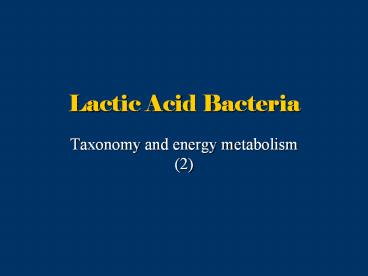Lactic Acid Bacteria PowerPoint PPT Presentation
1 / 23
Title: Lactic Acid Bacteria
1
Lactic Acid Bacteria
- Taxonomy and energy metabolism (2)
2
Lactobacillus spp.
- Group A
- Obligately homofermentative lactobacilli
- 6C to LA by glycolysis (EMP), possess
fructose-1,6-bisphosphate-aldolase (FDP), but
lack phosphoketolase (PK) - Group B
- Facultative heterofermentative
- EMP most, also possess FDP and PK
- Group C
- Obligately heterofermentative
3
- Arrangement of the Genus Lactobacillus
Group I obligately homofermentative
Group II facultatively heterofermentative
Group III obligately heterofermentative
Character
- - -
- Lb. acidophilus Lb. delbruckii Lb.
helveticus Lb. salivarius
-
Lb. casei Lb. curvatus Lb.
plantarum Lb. sake
-
Lb. brevis Lb. buchneri Lb. fermentum Lb.
reuteri
Pentose fermentation CO2 from glucose CO2 from
gluconate FDP aldolase present Phosphoketolase
present
4
Respiration vs. fermentation
- Respiration
- Glycolysis TCAelectron transport (oxidative
phosphorylation) - O2 is final electron receptor
- Glucose (C6) is completely oxidized to CO2
- C6H12O66O2 6CO26H2O38ATP
5
Respiration vs. fermentation
- Fermentation
- Glycolysis TCAelectron transport (oxidative
phosphorylation) - An organic compound is the final electron
acceptor - Glucose (C6) is converted to one or more 1-3
carbon compounds - Examples
- C6H12O6 2CH3-CH2OH
2CO22ATP (ethanol) - C6H12O6
2CH3-CHOH-COOH2ATP (LA) - C6H12O6
CH3-CHOH-COOHCH3-CH2-OHCO21ATP
6
Respiration vs. fermentation
- Some cells can respire and ferment sugars for
energy, depending on the growth conditions
(Saccharomyces cerevisiae) - Some cells can only respire or only ferment
sugars for energy (LAB)
7
Sugar metablism
- Glycolysis
- 6-phosphogluconate/phosphoketolase (6-PF/PK),
(pentose phosphate pathway, pentose
phosphooketolase pathway, hexose monophosphate
shunt)
8
C6
C5
FDP aldolase
PK
C2
LDH
C3
2C3
9
Homolactic fermentation of Glucose
(Embden-Meyerhof Pathway, GlycolysisLDH)
- Glucose
- G-P
- F-6-P
- F-1,6-P
- Dihydroxyacetone-P
Glyceraldehyde - PEP
- (2) Pyruvate
-
-
(2) Lactate
FDP aldolase
Products 2ATP 2Lactate Key enzymes FDP
aldolase Lactate dehydrogenase
Lactata dehydrogenase (LDH)
10
Mixed Acid Fermentation Alternative end
products for pyruvate
Glucose
FDP aldolase
Dihydroxyacetone-phosphate
Glyceralderhyde-3-phosphate
NAD NADHH
(2) ADP (2) ATP
LDH
(2) ADP (2) ATP
(2)Pyruvate
(2) Lactate
(2)CoA
(2)NADH(2)H
(2)NAD
(2) Formate
PFL
(2) Acetyl-CoA
NADHH NAD
Acetaldehyde
Products 3ATP 2 Formate 1 Ethanol 1 Acetate Key
enzymes FDP aldolase Pyruvate formate lyase (PFL)
Acetyl-phosphate
NADHH NAD
ADP ATP
Ethanol
Acetate
11
Heterolactic Fermentation of Glucose (Pentose
Phosphate Pathway)-Aerobic condition
Glucose
NADH oxidase
CO2
Ribulose-5-phosphate
Xylulose-5-phosphate
PK
Glyceralderhyde-3-phosphate
Acetyl-phosphate
Acetate
Pyruvate
Products 2ATP 2 CO2 1 Lactate 1 Acetate Key
enzymes PK LDH NADH oxidase
LDH
Lactate
12
Milk
- Lactose
- major fermentable sugar, 4050 g/l
- The glucose moiety of lactose is used faster than
galactose moiety by lactococci - Proteins
- Fat
- At the end of the growth phase, less than 0.5 of
the lactose is used by lactococci - The fermentation product of the lactococci is
L()-lactic acid
13
Lactose utilization in LAB
- Transport of lactose into cell
- Hydrolysis of lactose
- Metabolism of the monosaccharides
- Efflux of lactic acid and protons from the cell
- Unstable
14
(No Transcript)
15
Transport hydrolysis systems
- The PEP-PTS system
- Lactose phosphorylated during transport
- Multicomponent group translocation system
- Two cytoplasmic proteins Enz I and HPr
- Two lactose-specific components the
membrane-located LacE and the soluble
phosphocarrier LacF (or Enz IIlac and Enz IIIlac)
16
Transport hydrolysis systems
- Lactose 6-phosphate hydrolysed by
phospho-beta-galactosidase - Exclusively found in G
- Staphylococcus aureus, L. lactis, Lb. casei
17
LACTOSE PEP-PTS SYSTEM
membrane
Medium
E-I
PEP
P-HPr
out
in
HPr
P-EI
pyruvate
LACTOSE
P-EIII-lac
EII-Lac
E-III-lac
Lactose-P
P-beta-Galactosidase
Galactose-6P
Glucose
18
Pathways for Galactose and Lactose Catabolism
Galactose
Lactose
Galactose
PEP-PTS
Permease
PEP-PTS
Lactose-P
Galactose
Galactose-6P
P-beta-Gal
Gal-1P
Glucose
Tagatose-6P
Glu-1P
Glucose-6P
Glyceraldehyde-3P DHAP
Tagatose 1,6-diP
Glycolysis
19
(No Transcript)
20
Primary and secondary transport systems
- Lactose translocated unmodified
- Disaccharide hydrolysed by betagalactosidase
(lacz) - Primary-involve a sugar transport ATPase
- Agrobacterium radiobacter, Strep. mutans
- Secondary-couples with ions or other solutes
- L. lactis ATCC 7962 (proton), E.coli (LacY)
21
Secondary transport systems
- Secondary-couples with ions or other solutes
- L. lactis ATCC 7962 (proton-coupled), E.coli
(LacY) - LacS in Strep. thermophilus
- Proton symport or lactose-galactose antiporter
22
lactose
galactose
lactose
galactose
Bata-Gal
S. thermophilus Lb. bulgaricus Lb.
acidophilus Lb. lactis- dont have the ability
to ferment galactose
glucose
glycolysis
23
LACTOSE
Beta-Gal
LACTOSE
Gal
Glu
Gal-1-P
Glu-6-P
Glu-1-P
Glycolysis
Lb. helveticus

